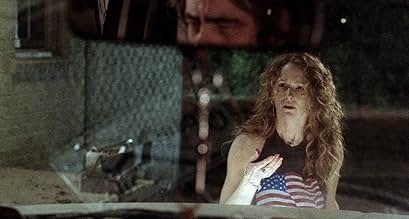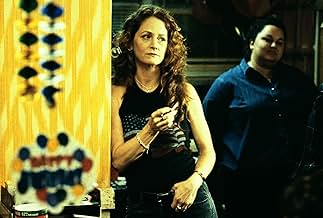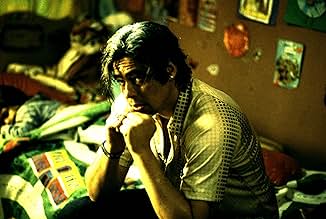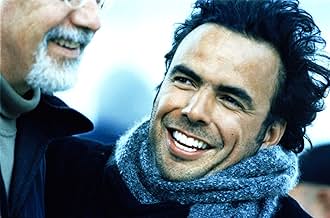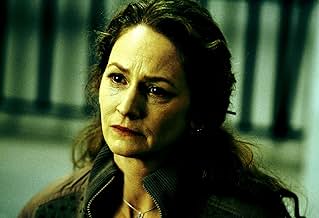Un accident bizarre réunit un mathématicien gravement malade, une mère éplorée et un ex-détenu repenti.Un accident bizarre réunit un mathématicien gravement malade, une mère éplorée et un ex-détenu repenti.Un accident bizarre réunit un mathématicien gravement malade, une mère éplorée et un ex-détenu repenti.
- Réalisation
- Scénario
- Casting principal
- Nommé pour 2 Oscars
- 30 victoires et 79 nominations au total
Marc Musso
- Freddy
- (as Marc Thomas Musso)
Avis à la une
I'm actually the opposite of a drama fan- but this movie really touched me, and although it's quite tough to take in, I loved it.
I think above all, one has to bow to Guillermo Arriaga, the writer, as "21 Grams" features probably the best script I've ever seen. I guess the story itself is not that new, but the way how it's done is simply excellent. The first, say, 30 minutes are just scraps- moments in the lives of the three main characters that mean absolutely nothing to the viewer (yet). Adding to that initial confusion is the fact that these scraps are not in temporal order so that in the beginning personally I wasn't sure I'd be able to follow- it was more like a music video that's just not making any sense at all. But then the pieces begin to come together just beautifully until in the end you can see the whole picture. Usually in these episode movies everything comes together at once somewhere in the middle of the film, but in "21 Grams" the viewer puts the pieces together one after another- like a jigsaw puzzle, and every bit as satisfying when everything's completed. This truly is a masterpiece script-wise, and I've never seen anything like it.
That brilliant script is supported by excellent actors. Sean Penn, Naomi Watts and Benicio del Toro are delivering the most convincing acting performance I've ever witnessed. Like when Christina (Watts) screams at Paul (Penn) trying to get rid of all of her anger, frustration, grief and hate: I usually think these emotional outbursts don't seem real on screen, but in this movie it is just deeply touching. I haven't seen "Mystic River" yet, but if Sean Penn was as good as he is in "21 Grams" then the Oscar finally really went to someone who truly deserved it. And Benicio del Toro really is every inch the wonderful actor his reputation claims (I saw him for the first time but had heard a lot of him before, so I was very curious).
Finally, thank you, Mr. Inárritu for putting everything together this nicely. You've made a very impressing 100 % quality movie.
I think above all, one has to bow to Guillermo Arriaga, the writer, as "21 Grams" features probably the best script I've ever seen. I guess the story itself is not that new, but the way how it's done is simply excellent. The first, say, 30 minutes are just scraps- moments in the lives of the three main characters that mean absolutely nothing to the viewer (yet). Adding to that initial confusion is the fact that these scraps are not in temporal order so that in the beginning personally I wasn't sure I'd be able to follow- it was more like a music video that's just not making any sense at all. But then the pieces begin to come together just beautifully until in the end you can see the whole picture. Usually in these episode movies everything comes together at once somewhere in the middle of the film, but in "21 Grams" the viewer puts the pieces together one after another- like a jigsaw puzzle, and every bit as satisfying when everything's completed. This truly is a masterpiece script-wise, and I've never seen anything like it.
That brilliant script is supported by excellent actors. Sean Penn, Naomi Watts and Benicio del Toro are delivering the most convincing acting performance I've ever witnessed. Like when Christina (Watts) screams at Paul (Penn) trying to get rid of all of her anger, frustration, grief and hate: I usually think these emotional outbursts don't seem real on screen, but in this movie it is just deeply touching. I haven't seen "Mystic River" yet, but if Sean Penn was as good as he is in "21 Grams" then the Oscar finally really went to someone who truly deserved it. And Benicio del Toro really is every inch the wonderful actor his reputation claims (I saw him for the first time but had heard a lot of him before, so I was very curious).
Finally, thank you, Mr. Inárritu for putting everything together this nicely. You've made a very impressing 100 % quality movie.
21 Grams features performances by Sean Penn, Benecio Del Torro and Naomi Watts that are remarkable not only for their believability, but also for the range of gut wrenching emotion they bring to bear. Telling his story almost violently out of sequence, Iñárritu makes no apology for presenting information in a manner that is often abrupt and/or confusing. His choice to juxtapose a myriad of images to reveal the complexities and subtleties of the characters challenges the viewer even as it elevates the story.
Each of the three main characters faces a series of crises that unfold in the fullness of Iñárritu's version of time. By so carefully painting characters' surroundings along with their reactions to the events that change their lives, lead characters are stripped to the bone. The supporting cast is nothing short of miraculous (notably Clea Duvall, Charlotte Gainsborg and Melissa Leo) and completes a wonderfully complex series of portraits of the three main characters.
Like few films in recent memory, 21 Grams fully reveals what it is to be human in the clutches of life's most challenging moments.
Each of the three main characters faces a series of crises that unfold in the fullness of Iñárritu's version of time. By so carefully painting characters' surroundings along with their reactions to the events that change their lives, lead characters are stripped to the bone. The supporting cast is nothing short of miraculous (notably Clea Duvall, Charlotte Gainsborg and Melissa Leo) and completes a wonderfully complex series of portraits of the three main characters.
Like few films in recent memory, 21 Grams fully reveals what it is to be human in the clutches of life's most challenging moments.
When lives collide, often no one is around to witness the effects of the collision. Alejandro González Iñárritu, however, has captured the profound effects in 21 Grams. How much does life weigh? Iñárritu may not answer that question directly, but he does indirectly answer the question darkly and beautifully in 21 Grams.
21 Grams tells the story of three lives brought together by tragedy: the life of a very sick man (Penn), a mother who has lost much (Watts), and a Christian who has recently reformed his ways (Del Toro). Really, these characters and their once-"simple" lives are the focus of this film, and all three characters are mysterious and deep. Each of the three actors gives an excellent performance, but it is Watts who stands out in all her angst. All of them deserved Academy Award nominations, and Penn would've received one along with Watts and Del Toro if not for his incredible performance in Mystic River.
Arriaga's screenplay is incredible too, leaving the outcome inexplicable enough to be real and to make sense. Santaolalla's score is odd enough to fit the dark atmosphere that pervades the film, and stick around for the credits to hear Dave Matthews' fitting conclusion. Also, Prieto's and Procopio's cinematography is gritty enough to depict the unbearable anguish of the characters.
I would praise the direction as well, except that I do have one complaint regarding it. It is often so choppy and irregular that it causes the story to lose a tiny bit of its impact. Perhaps this choppiness fits the film too, but to me it was distracting.
Yet you should definitely check this one out for a sorrowful picture of torment, disgust, and a strange beauty.
Final Grade: A.
21 Grams tells the story of three lives brought together by tragedy: the life of a very sick man (Penn), a mother who has lost much (Watts), and a Christian who has recently reformed his ways (Del Toro). Really, these characters and their once-"simple" lives are the focus of this film, and all three characters are mysterious and deep. Each of the three actors gives an excellent performance, but it is Watts who stands out in all her angst. All of them deserved Academy Award nominations, and Penn would've received one along with Watts and Del Toro if not for his incredible performance in Mystic River.
Arriaga's screenplay is incredible too, leaving the outcome inexplicable enough to be real and to make sense. Santaolalla's score is odd enough to fit the dark atmosphere that pervades the film, and stick around for the credits to hear Dave Matthews' fitting conclusion. Also, Prieto's and Procopio's cinematography is gritty enough to depict the unbearable anguish of the characters.
I would praise the direction as well, except that I do have one complaint regarding it. It is often so choppy and irregular that it causes the story to lose a tiny bit of its impact. Perhaps this choppiness fits the film too, but to me it was distracting.
Yet you should definitely check this one out for a sorrowful picture of torment, disgust, and a strange beauty.
Final Grade: A.
Many movies in the modern era have experimented with fractured chronology, but most of the time this technique is used for entertainment purposes only. "21 Grams" is an intense and thoughtful film enriched by this technique, taken to an extreme I've never seen before. We're not talking "Pulp Fiction" here, where a small series of vignettes are arranged out of sequence. Every individual scene in "21 Grams" seems to be distributed almost at random anywhere in the film. You have to concentrate when seeing this film for the first time, because you'll have trouble figuring out what's going on, and even as a plot starts to emerge, some of the details won't be understandable until the very end. But it pays off: this isn't like "Memento" or "Mulholland Drive," where you may need multiple viewings to understand it all. By the end of this film, the story turns out to be quite straightforward. It's like seeing a gigantic jigsaw puzzle gradually pieced together.
Unlike many other films that use this sort of device, "21 Grams" is a character drama, not a psychological thriller. The story would still work if it were told in chronological order. Why the scenes are arranged as they are is not altogether clear, on the surface. I felt like I was watching a mystery, but after everything came together it became evident that none of the mystery was contained in the plot itself. This fact has led some critics to suggest that the scrambled scene arrangement is nothing more than a cute gimmick designed to make the film more engaging. But I believe that the device does serve a legitimate purpose, by drawing out the complexity of the characters and their situations.
Life is not good for the three principal characters, and it isn't getting better. Sean Penn plays a 40-something man with a failing heart, Naomi Watts plays a young woman facing great tragedy, and Benicio Del Toro plays an ex-con consumed by guilt. Penn and Watts come off as ordinary individuals reacting as anyone might under the circumstances, but Del Toro's character is particularly fascinating. He's been rehabilitated through religion, but he's still far from perfect. As a father, he has a scary presence that makes him seem borderline abusive at times. But he has developed a powerful conscience. Is he right to hate himself for what he did? The movie never answers that question. I just appreciated that the film resisted the temptation to make him into a caricature. He is neither hero nor villain. He is simply understandable on a very basic human level, as are the other two characters.
We have the feeling that Watts and Penn are wrong to condemn him as strongly as they do. They do not understand his situation, or that he's suffering just about as much as they are. On the other hand, we as viewers can perfectly understand where Watts is coming from. That's what makes the scrambled scene arrangement so effective: it never allows any one character to gain our total sympathy. By the time we've sorted out the plot threads, we've identified with all three characters on an emotional level while at the same time understanding their faults. These people are trapped in their own limited worlds, and with our omniscient viewpoint we can scarcely blame any one of them for their feelings or actions. We can see clearly what these characters cannot, which is that they are more victims of cruel fate than people who are truly guilty of anything.
What is the movie's message? That people shouldn't be so quick to judge others? That could be one interpretation, but what's nice about the film is that it doesn't hammer this lesson into us. It just tells a moving and stirring tale about complex characters, and viewers can take from it what they please. The title refers to a parapsychological belief about the weight of the human soul, and it's used in this film as a metaphor for the fragility of life. If life is fragile, then it's also precious, and people need not waste their time on vengeance.
Unlike many other films that use this sort of device, "21 Grams" is a character drama, not a psychological thriller. The story would still work if it were told in chronological order. Why the scenes are arranged as they are is not altogether clear, on the surface. I felt like I was watching a mystery, but after everything came together it became evident that none of the mystery was contained in the plot itself. This fact has led some critics to suggest that the scrambled scene arrangement is nothing more than a cute gimmick designed to make the film more engaging. But I believe that the device does serve a legitimate purpose, by drawing out the complexity of the characters and their situations.
Life is not good for the three principal characters, and it isn't getting better. Sean Penn plays a 40-something man with a failing heart, Naomi Watts plays a young woman facing great tragedy, and Benicio Del Toro plays an ex-con consumed by guilt. Penn and Watts come off as ordinary individuals reacting as anyone might under the circumstances, but Del Toro's character is particularly fascinating. He's been rehabilitated through religion, but he's still far from perfect. As a father, he has a scary presence that makes him seem borderline abusive at times. But he has developed a powerful conscience. Is he right to hate himself for what he did? The movie never answers that question. I just appreciated that the film resisted the temptation to make him into a caricature. He is neither hero nor villain. He is simply understandable on a very basic human level, as are the other two characters.
We have the feeling that Watts and Penn are wrong to condemn him as strongly as they do. They do not understand his situation, or that he's suffering just about as much as they are. On the other hand, we as viewers can perfectly understand where Watts is coming from. That's what makes the scrambled scene arrangement so effective: it never allows any one character to gain our total sympathy. By the time we've sorted out the plot threads, we've identified with all three characters on an emotional level while at the same time understanding their faults. These people are trapped in their own limited worlds, and with our omniscient viewpoint we can scarcely blame any one of them for their feelings or actions. We can see clearly what these characters cannot, which is that they are more victims of cruel fate than people who are truly guilty of anything.
What is the movie's message? That people shouldn't be so quick to judge others? That could be one interpretation, but what's nice about the film is that it doesn't hammer this lesson into us. It just tells a moving and stirring tale about complex characters, and viewers can take from it what they please. The title refers to a parapsychological belief about the weight of the human soul, and it's used in this film as a metaphor for the fragility of life. If life is fragile, then it's also precious, and people need not waste their time on vengeance.
'21 Grams' tells of a number of loosely interlinked characters in an achronological fashion, jumping backwards and forwards over their stories. There can be reasons for doing this: for example, to reveal the plot in a way that offers an extra kick, or to enable the plot to conclude with a scene from the middle of the story that gains impact from the viewer's prior acquaintance with what happens next. Quentin Tarantino's 'Pulp Fiction' justified its own complex plot structure on both of these grounds. But in the case of this film, I couldn't see how telling the story in such a broken way was supposed to add anything; and the fact that most of the leading characters possess a death wish (or at least, very little will to go on living) hardly aided my emotional involvement. At times, the film appeared to be shaping into a story about the possibility (or otherwise) of redemption; but it never quite grew into anything more the harrowing tale of a number of people who suffer and (in some cases) die. The pretentious voice-over from Sean Penn's character that ends the film (and accounts for its title) felt to me like a desperate (and failed) attempt to inject some meaning into a movie strangely devoid of it.
That said, the acting is good, and the film is undoubtedly skilfully made. But "people die" is not, in itself, an adequate or interesting unifying theme.
That said, the acting is good, and the film is undoubtedly skilfully made. But "people die" is not, in itself, an adequate or interesting unifying theme.
Le saviez-vous
- AnecdotesThe film was shot almost completely with hand-held cameras.
- GaffesWhen the Private Investigator gives Paul the revolver, he flips it open to show that it is loaded. He then spins the cylinder and we hear a ratcheting sound. When a revolver is open, there is no ratchet mechanism connected to the cylinder...it rotates freely and silently.
- Citations
[last lines]
Paul Rivers: How many lives do we live? How many times do we die? They say we all lose 21 grams... at the exact moment of our death. Everyone. And how much fits into 21 grams? How much is lost? When do we lose 21 grams? How much goes with them? How much is gained? How much is gained? Twenty-one grams. The weight of a stack of five nickels. The weight of a hummingbird. A chocolate bar. How much did 21 grams weigh?
- Crédits fousThanks to ÁLos amo!
- Bandes originalesCan We Get Together
(2003)
Written by Renee Funderburgh, Anson Funderburgh and John Street
Performed by Anson Funderburgh & The Rockets (as Anson Funderburgh and Rockets)
Licensed courtesy of Bullseye Blues & Jazz, a Rounder Records Group label
By Arrangement with Ocean Park Music Group
Meilleurs choix
Connectez-vous pour évaluer et suivre la liste de favoris afin de recevoir des recommandations personnalisées
- How long is 21 Grams?Alimenté par Alexa
Détails
- Date de sortie
- Pays d’origine
- Site officiel
- Langue
- Aussi connu sous le nom de
- 21 gramos
- Lieux de tournage
- Sociétés de production
- Voir plus de crédits d'entreprise sur IMDbPro
Box-office
- Budget
- 20 000 000 $US (estimé)
- Montant brut aux États-Unis et au Canada
- 16 290 476 $US
- Week-end de sortie aux États-Unis et au Canada
- 274 454 $US
- 23 nov. 2003
- Montant brut mondial
- 60 466 876 $US
- Durée
- 2h 4min(124 min)
- Couleur
- Mixage
- Rapport de forme
- 1.85 : 1
Contribuer à cette page
Suggérer une modification ou ajouter du contenu manquant



